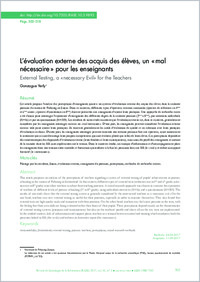External testing, a "necessary evil" for the teachers
HEP|PH FR
- Yerly, Gonzague HEP Fribourg / PH Freiburg
-
2017
Published in:
- Revista de Sociología de la Educación. - 2017, vol. 10, no. 3, p. 502-518
pilotage par les résultats
Suisse
évaluation externe
enseignants du primaire
perceptions
méthodes de recherche mixtes
accountability
Switzerland
external testing
primary teachers
perceptions
mixed research methods
English
French
This article proposes an analysis of the perceptions of teachers regarding a system of external testing of pupils’ achievements in primary schooling in the canton of Fribourg in Switzerland. In this context, different types of external tests (reference test in 4th and 6th grade; selection test in 8th grade) must allow teachers to adjust their teaching practices. A mixed research approach was chosen to examine the experience of teachers of different levels of primary schooling (3rd to 8th grade), using individual interviews (N=16) and a questionnaire (N=305). The results of our study show that the external testing system is generally considered by the interviewed teachers as a «necessary evil.» On the one hand, teachers can view external testing as useful for their practices, especially in order to reassure themselves. They also found that external tests are high-quality tools and consistent with their practices. On the other hand, teachers may feel some pressure in the tests, with the feeling that their own skills are being evaluated rather than those of their pupils. These perceptions depend mainly on the characteristics of external testing systems (purposes and consequences) but also on the teachers’ profile and above all on the way tests are implemented. In the studied context, lack of information and support places teachers in a tension between control and training which reinforces both the pressures linked to EE (the «evil») and reduces its formative input (the «necessary»).
Cet article propose l’analyse des perceptions d’enseignants quant à un système d’évaluation externe des acquis des élèves dans la scolarité primaire du canton de Fribourg en Suisse. Dans ce contexte, différents types d’épreuves externes cantonales (épreuve de référence en 4ème et 6ème année ; épreuve d’orientation en 8ème) doivent permettre aux enseignants d’ajuster leurs pratiques. Une approche de recherche mixte a été choisie pour interroger l’expérience d’enseignants des différents degrés de la scolarité primaire (3ème à 8ème), par entretiens individuels (N=16) et par un questionnaire (N=305). Les résultats de notre étude montrent que l’évaluation externe est, dans ce contexte, généralement considérée par les enseignants interrogés comme un « mal nécessaire ». D’une part, les enseignants peuvent considérer l’évaluation externe comme utile pour ajuster leurs pratiques. Ils trouvent généralement les outils d’évaluation de qualité et en cohésion avec leurs pratiques d’évaluation en classe. D’autre part, les enseignants interrogés peuvent ressentir une certaine pression face aux épreuves, ayant notamment le sentiment que se sont davantage leurs propres compétences qui sont évaluées plutôt que celles de leurs élèves. Ces perceptions dépendent des caractéristiques des dispositifs d’évaluation externe (leurs finalités et leurs conséquences), mais aussi du profil des enseignants et surtout de la manière dont les EE sont implémentés sur le terrain. Dans le contexte étudié, un manque d’information et d’accompagnement place les enseignants dans une tension entre contrôle et formation qui renforce à la fois les pressions liées aux EE (le « mal ») et réduit son apport formatif (le « nécessaire »).
- Faculty
- HEP|PH FR
- Language
-
- French
- Classification
- Education, teaching
- License
-
License undefined
- Identifiers
-
- RERO DOC 306326
- Persistent URL
- https://folia.unifr.ch/unifr/documents/312585
Statistics
Document views: 264
File downloads:
- Texte intégral: 212
